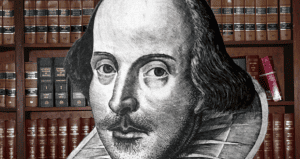Shakespeare Oxford Newsletter columnist Mark Anderson writes about one of the more famous of the apocryphals, Thomas of Woodstock — a play sometimes referred to as Richard II, Part I, an indication of just how well it fits in with the Shakespeare play. Woodstock was recently produced in summer 1999 for the first time in North America by the Hampshire Shakespeare Company (Northampton, Mass.), then again during winter 2000 at Lesley College in Cambridge, Mass., and is now scheduled for an equity production at the Carmel Shake-speare Festival in fall, 2001 (Carmel, Calif.). Thomas clearly has some flashes of Shakespeare-like wit and dialogue, and just as clearly is the perfect companion play for Richard II. All that’s left to ponder is: Who wrote it?

